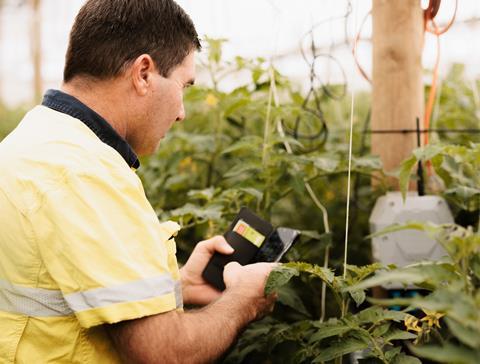‘Greenhouse Gemini’ project tracks key environmental factors and adjusts systems to improve resource efficiency

South Australia-based organic vegetable grower Eldridge Fresh Organics has harnessed the power of artificial intelligence (AI) to monitor and track the entire growing chain of produce in real time, digitising the entire process.
Starting with greenhouse management, the system tracks key environmental factors such as CO2 levels, water usage, humidity, and soil moisture and the system automatically adjusts vents, fans, and heaters to optimise growing conditions and improve resource efficiency.
Chief executive, Shane Eldridge said this cutting-edge approach delivered via the Eldridge Fresh ‘Greenhouse Gemini’ project has been funded in part by a grant from the state government’s AgTech Growth Fund.
“The effective integration of AI technology into our operations is a significant leap forward in enhancing sustainability and efficiency in organic farming. Integrating monitoring of temperature, water control, and carbon emission reporting sets a new benchmark for the greenhouse industry and means we can make informed decisions on future technological upgrades,” said Eldridge.
The new system, which has been tested in real-world conditions within Eldridge Fresh’s greenhouse facilities over recent months, has the potential to boost South Australia’s economy, create jobs and solidify the state as a global leader in sustainable agriculture, according to Eldridge Fresh.
The ‘Greenhouse Gemini’ project is named for its doubled benefit, tracking both within the greenhouse and beyond through the cold chain process.
“Once produce is ready for harvest, the twin benefit of the software continues into dispatch activity by tracking it through the cold chain process by sorting, grading and managing tailored customer orders to ensure that the sales team is provided with up-to-date stock information to reduce supply delays,” Eldridge said.
“This capability also enables smarter sales decisions because it allows for pricing adjustments to be made based on demand and reduces overall food waste.”
The ‘Greenhouse Gemini’ project also collates data that could help to better understand the environmental impact of growing operations and potentially identify ways to offset emissions through more efficient and environmentally responsible greenhouse and broader growing practices.
“Technologically advanced and sustainable horticulture is crucial for addressing the challenges of higher temperatures and lower winter rainfall – and this AI software will help us to manage these issues far more sustainably than ever before, ensuring the long-term viability of our agriculture sector,” Eldridge said.



